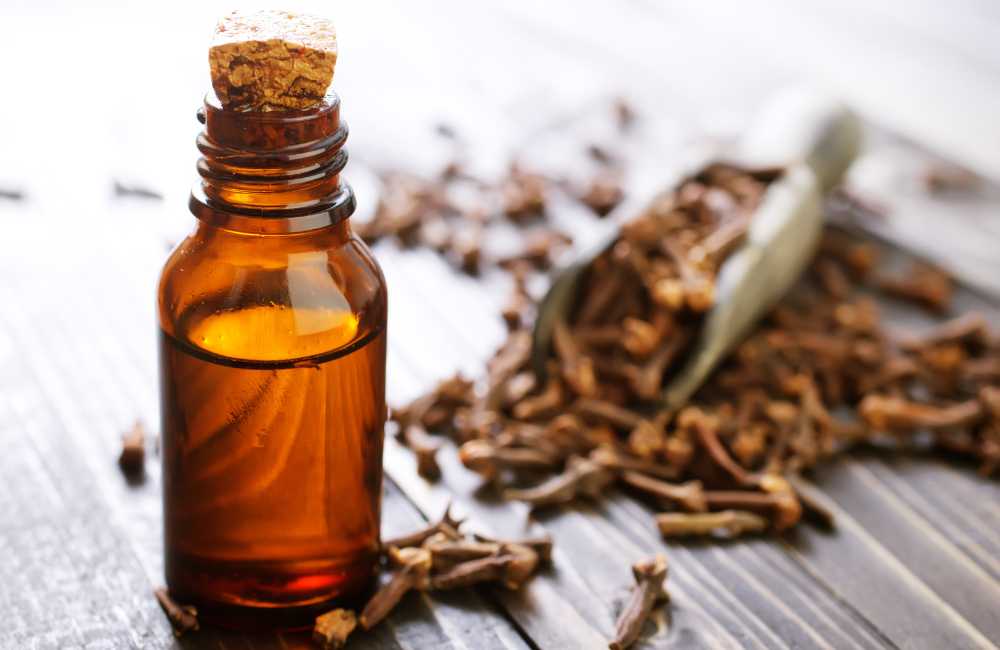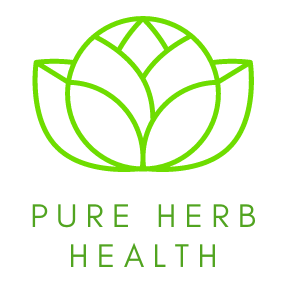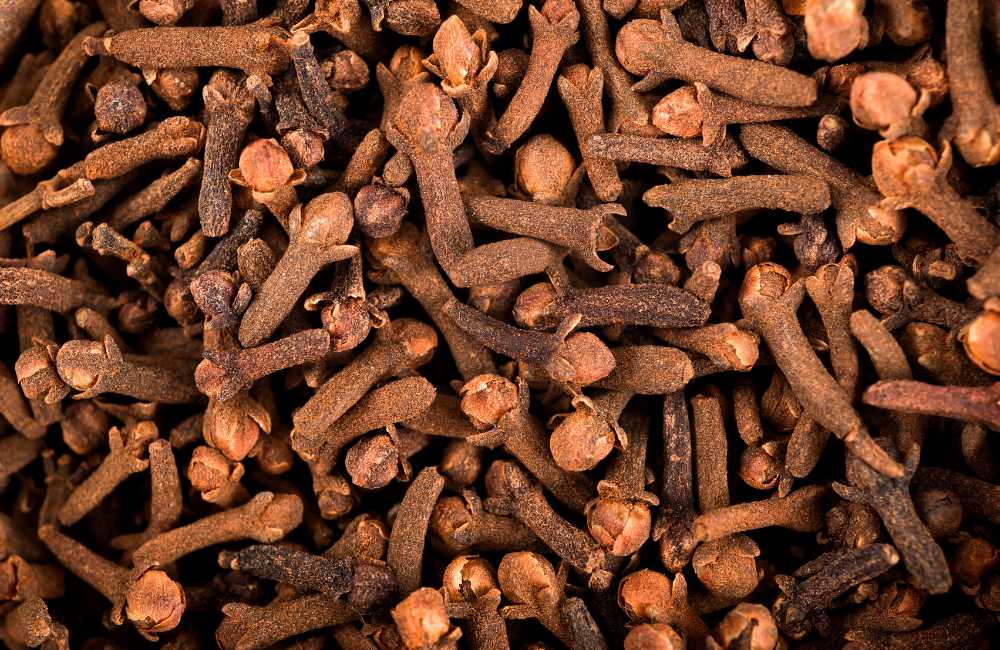Cloves (Syzygium aromaticum) are among the top most precious spices in the world, they are not just used for spicy dishes but have amazing health benefits. Sure most of us have heard about the spice but today, we are going to explore the world of cloves, the champion spice together.
Cloves are unopened flower buds growing on a medium size evergreen tree(8-12m) from the Myrtaceae family, originally native to Maluku islands in east Indonesia before spreading to India, Malaysia, SriLanka, Madagascar and Tanzania.
The tree is cultivated in coastal areas at a maximum altitude of 200m above sea level. The flower buds are the commercialized part of the tree and it starts production after four years of plantation.
The flower buds are at first a pale colour and gradually become green, after which they develop into a bright red when they are ready for collection. They are collected in the maturation phase before flowering, when the cloves consist of a long calyx, terminating in four spreading sepals and four unopened petals, which form a small ball.
Clove buds are deep brown and possess an intense fragrance and burning taste. It has a powerful fragrant odour which is warm, pungent, strongly sweet and slightly astringent.
In India, it is used in almost all spicy dishes while in Indonesia, it is used in the production of kretek cigarettes (one part of cloves mixed with two parts of tobacco) marketed now as filtered clove cigars.
Cloves have other common names like Carophyllus, Clovis, and Caryophyllus. In Hindi it is called Laung, Lavang or Laumg.
Nutrient content of clove
This varies according to the climatic conditions involved in the farming, processing and storage of the cloves. The dried clove bud contains:
- Carbohydrates
- Fixed oils; Steam-volatile oil
- Resins; Tannins
- Cellulose; Pentosans
- Proteins; Vitamins; Minerals
Chemical composition of clove
This can be divided into two:
- The volatile constituents
Clove yields different types of volatile oil from the leaves, stem, buds and fruits. These differ in yield and quality considerably depending on and are influenced by a lot of factors including the method of distillation.
The chief component of all types of oil is eugenol which is higher in the clove bud.
- Non – volatile constituents
A few non-volatile compounds have been isolated from cloves which include tannins, sterols, triterpenes and flavonoids
Health benefits of cloves
Clove has so many health benefits which are largely due to its content of bioactive compounds. Let us explore these health uses and benefits together:
-
Improves dental health
Clove is known to possess an antibacterial property that makes it valuable in its use in dental creams, toothpaste, mouthwashes, and throat spray to cleanse bacteria. It is used to relieve pain from sore gums and to improve overall dental health.
A combination of eugenol and zinc oxide is used for the temporary filling of cavities in dentistry. Clove is an anodyne (an agent that soothes or relieves pain) for dental emergencies.
-
Better sexual health
Cloves can be used as an aphrodisiac (an agent for arousing or increasing sexual desire or potency). Clove in combination with Panax ginseng root, Angelica root, Cistanches Deserticola, Zanthoxylum species, Torlidis seed, Asiasari root, cinnamon bark and toad venom (SS cream) in a cream, when applied to the skin of the penis improves premature ejaculation.
-
Anti-inflammatory agent
Clove is used as an anti-inflammatory agent, due to its high content of flavonoids. Aroma therapists use pure clove oil to cure the symptoms of rheumatism and arthritis.
-
Better digestive health
Clove is used as a carminative (a drug used to relieve flatulence), to increase hydrochloric acid in the stomach and improves peristalsis. Clove can effectively take care of digestive problems due to its medicinal ability to cure flatulence, indigestion and nausea. Clove is used in relieving the symptoms of diarrhoea, gastric irritability and vomiting.
-
Skin health
A paste of clove powder in honey is effective in treating acne. A paste of clove powder in water aids the fast healing of cuts and bites.
-
Mosquito repellant
It has been shown that applying clove oil or clove oil gel to the skin repels mosquitoes for up to five hours.
-
Boosts immune system
Clove and clove oil has been used to boost the immune system by purifying the blood and helping to fight against various diseases.
-
Antifungal activity
Clove oil has been used to cure Athlete’s foot and nail fungal infections.
-
Soothes respiratory system
Cloves exhibit good activity as expectorants. It promotes the discharge of mucous and secretions in the respiratory passage.
When the aromatic clove oil is inhaled, it can help soothe respiratory conditions like colds, coughs, asthma, bronchitis, and sinusitis. It can also help to clear the nasal tract.
-
Cancer prevention
Cloves can effectively prevent lung and skin cancers. Eugenol helps in minimizing the harmful effects of environmental wastes that can cause cancer of the digestive system.
-
Reduces blood sugar
Cloves help in diabetes prevention and management as it helps to control blood glucose levels. Clove extracts act like insulin in cells to bring about the reduction of blood glucose levels.
Clove oil stimulates blood flow and circulation making it useful for persons having cold extremities. Sucking a clove bud reduces the desire for alcohol. Muscular cramps are often relieved when clove oil is applied as a poultice near the affected area.

-
Relieves headaches
It has been found that sniffing the spicy aroma of cloves reduces drowsiness, irritability and headaches. One drop of clove oil applied to the roof of the mouth can instantly relieve many headaches.
-
Improved brain health
Clove enhances memory retention. Clove can be used for relieving brain fog, lethargy and a depressive state of mind.
-
Better eyes
Cloves may help in preventing the breakdown in the retina of the eye thereby slowing down the macular degeneration and helping vision in old age. This is achieved through the prevention of the breakdown of docosahexaenoic acid, which preserves vision in the elderly.
-
Blood pressure
Clove has been shown to reduce high blood pressure due to its anti-inflammatory activity and high anti-oxidant effects. Eugenol is the substance in clove that accounts for these.
-
Anti-oxidant
Cloves are full of antioxidants. These compounds help fight free radicals that damage the body cells thereby leading to certain diseases. By removing these free radicals, the risk of developing heart disease, diabetes and certain cancers is reduced.
A drop of clove oil is about 400 times more powerful as an anti-oxidant than wolfberries or blueberries. The ORAC (Oxygen Radical Absorption Capacity) test is a scale developed by the U.S. Department of Agriculture for comparing antioxidant activity. The ORAC score of clove is about ten million.
-
Antipyretic effect
Eugenol, the chief constituent of clove oil has been shown to be more effective in reducing fever than paracetamol. It worked like other common antipyretic agents.
-
Antiplatelet
Eugenol and Acetyl eugenol (two active constituents of clove) were shown to be more potent than aspirin in inhibiting platelet aggregation thereby preventing blood clots.
-
Insecticidal activity
Eugenol, isoeugenol and methyl eugenol (all extracts of clove) has been shown to have an insecticidal activity to pathogens that attack stored food. The clove leaf and bud oils showed potent insecticidal activity against the human head louse (pediculus capitis)
-
Veterinary uses
Peppermint tea sprinkled with clove and ginger can be used to treat vomiting in dogs. One teaspoon or more is effective. Clove oil can be used as a pain killer in dogs, especially for tooth pain. Clove oil has been effective in treating the foreign matter in dog and cat ears.
-
Culinary uses
Clove is often used to flavour meat products, pastries, cookies, candies, chewing gum, drinks etc.
-
Other uses
Clove is used to flavour Pharmaceuticals. Clove oil is used to flavour toothpaste. The leaf oil is used to impart fragrance to perfumes.
Caution
According to the World Health Organization (WHO), the acceptable daily dosage of cloves per day is 2.5mg/kg of body weight. Taking more than this can cause complications as listed below:
- Hypoglycemia (low blood sugar levels) may require intravenous glucose intervention.
- Agitation.
- Decrease in consciousness and coma arising within hours of ingestion (like 10-30ml of clove oil).
- There is typically accompanying acidosis, and respiratory depression requiring ventilation.
- Blood in the urine; No urine output; Painful urination
- Seizures
- Liver damage (especially in children) and fluid imbalances
- Abdominal pain; Diarrhea; Nausea and vomiting
Cloves preparations
- Whole dried flower buds of the clove
- Ground cloves(powder)
- Clove oils
Cloves interaction with drugs
- Anticoagulant/antiplatelet drugs
Clove might slow blood clotting. Using clove and medications that also slow blood clotting might increase the risk of bruising and bleeding.
- Antidiabetic medications
Taking drugs that reduce blood glucose levels alongside clove may increase the action of the anti-diabetic drug and decrease the blood sugar more than the required level.
Always consult with your health professional if there is a need for you to take clove while on any of the above medications.
Conclusion
It can be concluded that clove is a very great spice in all ramifications. A king among all the other antioxidant herbs as can be seen in our discussion above. Clove is medicinally powerful with a rich and solid traditional heritage and history.
In summary, clove has physical, mental and emotional health benefits. Clove possesses antioxidant, anti-fungal, anti-viral, anti-microbial, anti-diabetic, anti-inflammatory, anti-thrombotic, anaesthetic, pain reliving and insect-repellent properties.
Eugenol is the main constituent responsible for the medicinal properties of the clove bud. Clove is judged to be the most important spice in the world trade.

